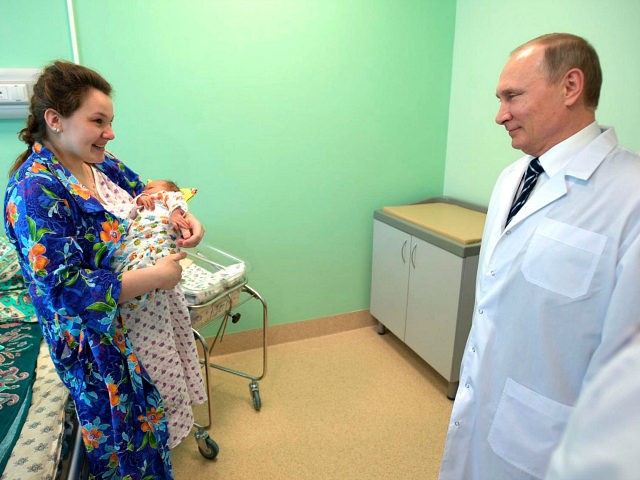Russia’s demographic crisis was put in stark terms by Ilan Berman in a Moscow Times editorial on Tuesday, as he quoted a report from Russia’s statistics agency that spoke of “extinction.”
Berman cites Rosstat figures that Russia had 70,000 fewer births in the first four months of 2017 than it did over the same period in 2016, suggesting an overall population decline of 300,000 by 2018. Russia’s current population is just over 143 million, but President Vladimir Putin has predicted it could shrink to 107 million by 2050.
One of Putin’s ideas for dealing with the problem was to offer an $11,000 bonus for having at least two children. That is roughly equivalent to the annual income of the average Russian middle-class worker, but Berman reports the impact of the bonus program was “negligible.”
Russia actually gives parents a medal for having seven or more children, the Order of Parental Glory, but that has not helped much either.
Russia is unusual among demographically-challenged countries in having an official blueprint for dealing with the problem, but it is evidently a rather vague “blueprint” that has yet to produce much in the way of effective policy. Berman suggests the Kremlin knock off its extensive military spending and “foreign adventurism in places like Ukraine and Syria,” and spend more on health care and education. The Kremlin is not very likely to heed that advice.
Putin did not offer his rubles-for-rugrats scheme as a crisis measure for dealing with demographic collapse. He flaunted it as a sign of inevitable Russian triumph while taunting European nations for their anemic birth rates. His criticism was not without merit, as Germany, Italy, Austria, Spain, Greece, and Portugal all have lower birth rates than Russia – the latter three nations’ birth rates are much lower.
Putin crowed that his policies would “take care of people and increase human capital as Russia’s most important resource” in December 2016.” He told his parliament he expected human capital to blossom so much that Europe and the United States would lose their ability to prod Russia with sanctions. However, while Russia’s birth rate has ticked up a bit lately, it remains well below the level Putin confidently predicted.
Birth rates are only part of the demographic puzzle. Russia suffers from persistent life expectancy problems, particularly among male heavy drinkers, and occasional mortality spikes nobody can figure out. Healthy birth rates can go a long way toward offsetting high mortality rates in a population and, conversely, long life expectancy does not help to sustain a population if the birth rate falls far enough.
Some analysts believe, contrary to Ilan Berman’s gloomy forecast, that Russia’s birth rates have rebounded well enough to defuse the demographic crisis. A Reuters piece in March argued that Russia’s private health care industry is booming due to rising fertility rates, driven by the desire of new parents to obtain better maternity care than the state provides.
Alternatively, one might speculate that increasingly accessible and affordable private care is making couples more comfortable with accepting the risks and hardships of childbirth. State-run clinics in Russia don’t sound like a very welcoming environment for accepting stork deliveries as Reuters describes them.
If things really are looking up, then Russia is emerging from what Business Insider called a “perfect demographic storm” that was “crippling” the nation in 2015. Up to 30 percent of Russian deaths in one study were alcohol-related. Russia has also battled other forms of drug abuse, and a serious HIV/AIDS crisis, contributing to that notoriously high mortality rate for Russian men. It is likely that men embarked upon such tragically short life paths are not settling down to family life and raising children.
There is no getting around the simple reality that population growth demands a sizable number of couples having three or more children, which generally requires getting started on family life at a relatively young age. Financial incentives to defray the cost of having and raising children may be helpful, but Russia’s experience offers the latest evidence that it takes more than money for populations to flourish.

COMMENTS
Please let us know if you're having issues with commenting.